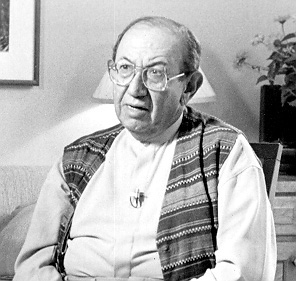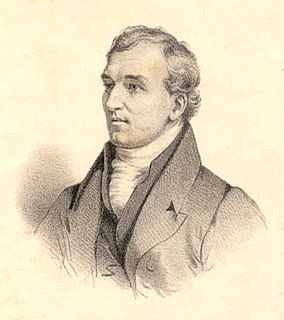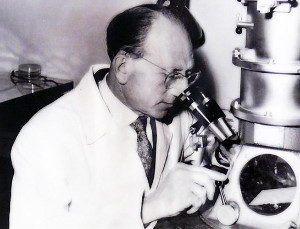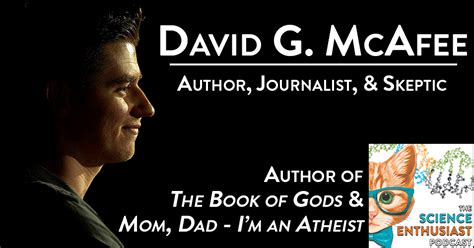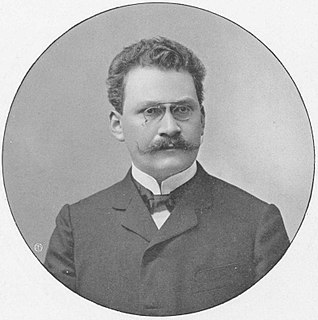Top 405 Hypothesis Quotes & Sayings - Page 7
Explore popular Hypothesis quotes.
Last updated on December 18, 2024.
There are, after all, atheists who say they wish the fable were true but are unable to suspend the requisite disbelief, or who have relinquished belief only with regret. To this I reply: who wishes that there was a permanent, unalterable celestial despotism that subjected us to continual surveillance and could convict us of thought-crime, and who regarded us as its private property even after we died? How happy we ought to be, at the reflection that there exists not a shred of respectable evidence to support such a horrible hypothesis.
What is the fundamental hypothesis of science, the fundamental philosophy? We stated it in the first chapter: the sole test of the validity of any idea is experiment. ... If we are told that the same experiment will always produce the same result, that is all very well, but if when we try it, it does not, then it does not. We just have to take what we see, and then formulate all the rest of our ideas in terms of our actual experience.
There is the global teenager hypothesis, that what happened in the '60s in America was that there was, the baby boom cohort grew up at the same time that television and popular music grew up, so that we had this carrier frequency that we all tuned into that gave us the feeling of a common culture, even though I was in Phoenix and someone was in Des Moines. That now we are getting the global cohort at the same time we have our first global communications. MTV is everywhere.
If I may bend your ear for a moment, I like Terry Pratchett. I like footnotes. I like footnotes even when they are not as entertaining as a Pratchett footnote, even when they are in the middle of a book on evolutionary biology and briefly explain the Red Queen hypothesis or the fate of the Stephen's Island Wren or how many bunnies can dance on the back of Australia. Footnotes fill me with a very mild glee. The endnote simply does not compare.
It's likely that CO2 has some warming effect, but real proof of that hypothesis is tricky. You have to confirm by observation exactly how the CO2 changes the situation at different altitudes in the atmosphere and in different regions of the world. For example, CO2 is supposed to warm the upper air faster than the surface, but the measurements don't show that happening. When the CO2 effect is eventually pinned down, it will probably turn out to be weaker and much less worrisome than predicted by the global warming theorists.
While the scientist, on the one hand, is concerned with giving a faithful description of facts, on the other, he has the equally important task of construing them in relation to some explanatory conjecture. Similarly the historian has a double duty: both of reporting the past as nearly as possible as it passed or was lived through by men at the time (without doctoring up events to fit later developments or some more "enlightened reading" of them); and second, of interpreting their import in the light of a present hypothesis.
Intelligence is one of the greatest human gifts. But all too often a search for knowledge drives out the search for love. This is something else I've discovered for myself very recently. I present it to you as a hypothesis: Intelligence without the ability to give and receive affection leads to mental and moral breakdown, to neurosis, and possibly even psychosis. And I say that the mind absorbed in and involved in itself as a self-centered end, to the exclusion of human relationships, can only lead to violence and pain.
... one of the main functions of an analogy or model is to suggest extensions of the theory by considering extensions of the analogy, since more is known about the analogy than is known about the subject matter of the theory itself ... A collection of observable concepts in a purely formal hypothesis suggesting no analogy with anything would consequently not suggest either any directions for its own development.
If it were possible to transfer the methods of physical or of biological science directly to the study of man, the transfer would long ago have been made ... We have failed not for lack of hypotheses which equate man with the rest of the universe, but for lack of a hypothesis (short of animism) which provides for the peculiar divergence of man ... Let me now state my belief that the peculiar factor in man which forbids our explaining his actions upon the ordinary plane of biology is a highly specialized and unstable biological complex, and that this factor is none other than language.
Even if matter could do every outward thing that God does, the idea of it would not work as satisfactorily, because the chief callfor a God on modern men's part is for a being who will inwardly recognize them and judge them sympathetically. Matter disappoints this craving of our ego, so God remains for most men the truer hypothesis, and indeed remains so for definite pragmatic reasons.
The TV scientist who mutters sadly, "The experiment is a failure; we have failed to achieve what we had hoped for," is suffering mainly from a bad script writer. An experiment is never a failure solely because it fails to achieve predicted results. An experiment is a failure only when it also fails adequately to test the hypothesis in question, when the data it produces don't prove anything one way or another.
How can this strange story of God made flesh, of a crucified Savior, of resurrection and new creation become credible for those whose entire mental training has conditioned them to believe that the real world is the world which can be satisfactorily explained and managed without the hypothesis of God? I know of only one clue to the answering of that question, only one real hermeneutic of the gospel: a congregation which believes it.
Have the models been successful in predicting anything? They, of course, predict substantial global warming. This is not surprising given the expressed belief of some of the model builders in the global warming Hypothesis and the many parameters in the model that need to be introduced. However, the models also predict unambiguously that the atmosphere is warming faster than the surface of the earth; but all the available observational data unambiguously shows the opposite!
There's a scientific hypothesis that every person's name is a primary suggestive command that contains the entire script of their life in highly concentrated form. . . . According to this point of view, there is only a limited number of names, because society only needs a limited number of human types. Just a few models of worker and warrior ants, if I could put it like that. And everybody's psyche is preprogrammed at a basic level by the associative semantic fields that their first name and surname activate.
If complex organisms demand an explanation, so does a complex designer. And it's no solution to raise the theologian's plea that God (or the Intelligent Designer) is simply immune to the normal demands of scientific explanation. To do so would be to shoot yourself in the foot. You cannot have it both ways. Either ID belongs in the science classroom, in which case it must submit to the discipline required of a scientific hypothesis. Or it does not, in which case, get it out of the science classroom and send it back to church, where it belongs.
From the almost total absence of fossil evidence relative to the origin of the phyla, it follows that any explanation of the mechanism in the creative evolution of the fundamental structural plans is heavily burdened with hypothesis. This should appear as an epigraph to every book on evolution. The lack of direct evidence leads to the formulation of pure conjecture as to the genesis of the phyla; we do not even have a basis to determine the extent to which these opinions are correct.
A perfect historian must possess an imagination sufficiently powerful to make his narrative affecting and picturesque; yet he must control it so absolutely as to content himself with the materials which he finds, and to refrain from supplying deficiencies by additions of his own. He must be a profound and ingenious reasoner; yet he must possess sufficient self-command to abstain from casting his facts in the mould of his hypothesis.
You discover your true faith when you start flowing with your conscience. After lessons, visions, and theories validate themselves to you, you build faith in that hypothesis/ feeling/ idea that originated from your own heart and mind - not that of others. Before you submit to any one religion, create your own and find which one out there resonates closest with the one already in your heart. This is the way to choose your faith.
In fact, whenever energy is transmitted from one body to another in time, there must be a medium or substance in which the energy exists after it leaves one body and before it reaches the other ... and if we admit this medium as an hypothesis, I think it ought to occupy a prominent place in our investigations, and that we ought to endeavour to construct a mental representation of all the details of its action, and this has been my constant aim in this treatise.
Darwin and his successors have railed against the fallacy of confusing the current utility of a trait with the reason the trait evolved. For example, Darwin argued that skull sutures in mammals did not evolve because they facilitate live birth; the sutures were in place well before live birth evolved. Checking the chronological order in which different traits evolved in a lineage is one way to test an adaptive hypothesis; the fact of common ancestry is what makes that checking possible.
It is my hypothesis that the fundamental source of conflict in this new [post-Cold-War] world will not be primarily ideological or primarily economic. The great divisions among humankind and the dominating source of conflict will be cultural. Nation states will remain the most powerful actors in world affairs, but the principal conflicts of global politics will occur between nations and groups of different civilizations. The clash of civilizations will dominate global politics. The fault lines between civilizations will be the battle lines of the future.
To find the point where hypothesis and fact meet; the delicate equilibrium between dream and reality; the place where fantasy and earthly things are metamorphosed into a work of art; the hour when faith in the future becomes knowledge of the past; to lay down one's power for others in need; to shake off the old ordeal and get ready for the new; to question, knowing that never can the full answer be found; to accept uncertainties quietly, even our incomplete knowledge of God; this is what man's journey is about, I think.
The earliest signs of living things, announcing as they do a high complexity of organization, entirely exclude the hypothesis of a transmutation from lower to higher grades of being. The first fiat of Creation which went forth, doubtlessly ensured the perfect adaptation of animals to the surrounding media; and thus, whilst the geologist recognizes a beginning, he can see in the innumerable facts of the eye of the earliest crustacean, the same evidences of Omniscience as in the completion of the vertebrate form.
I would be lying, however, if I claimed that I could always formulate worthwhile hypotheses on the basis of my theoretical framework. Sometimes there were no reflexive processes to be found; sometimes I failed to find them; and, what was the most painful of all, sometimes I got them wrong. One way or another, I often invested without a worthwhile hypothesis and my activities were not very different from a random walk.
I intend to discuss some perplexing issues which are raised once we embrace the hypothesis that society can be deschooled; to search for criteria which may help us distinguish institutions which merit development because they support learning in a deschooled milieu; and to clarify those personal goals which would foster the advent of an Age of Leisure (schole) as opposed to an economy dominated by service industries.
The more experiences and experiments accumulate in the exploration of nature, the more precarious the theories become. But it is not always good to discard them immediately on this account. For every hypothesis which once was sound was useful for thinking of previous phenomena in the proper interrelations and for keeping them in context. We ought to set down contradictory experiences separately, until enough have accumulated to make building a new structure worthwhile.
When you look at any experimental work not directly related to economics, but trying to test rational behavior in other ways, experiments have conspicuously failed to show rational behavior. Macro evidence certainly suggests deviations from rationality, but I don't want to say the rationality hypothesis is completely wrong. If you have any introspective idea or experimental idea about people's behavior, it seems to be incompatible with the really full scale rational expectations.
In real science a hypothesis can never be proved true...A science which confines itself to correlating phenomena can never learn anything about the reality underlying the phenomena, while a science which goes further than this and introduces hypotheses about reality, can never acquire certain knowledge of a positive kind about reality; in whatever way we proceed, this is forever denied us.
Darwin repeatedly used the hypothesis of common ancestry as a platform on which to build his various ideas about testing hypotheses concerning natural selection. He also argued that adaptive similarities provide little or no evidence for common ancestry. Although this second claim needs to be fine-tuned, Darwin was right that ample evidence for common ancestry can exist even if none of the characteristics we observe were caused to evolve by natural selection.
Then he is a monster!" the Prince crowed, "and I must slay him at once. The Formula works!" "Your Formula must result in a great deal of fighting," I mused. "Oh, yes, when applied correctly mighty and noble battles result! Of course I always win—the value of Prince X is a constant. It cannot be lesser than that of Monster Y—this is the Moral Superiority Hypothesis made famous five hundred years ago by my ancestor Ethelred, the Mathematician-King. We have never seen his equal, in all these centuries.
Any strategy that attempts to reinforce faith by undermining science is also doomed to failure. Showing that some scientific theory is wrong will not prove that the religious alternative is correct by default. When the sun was shown not to be the center of the universe, as Copernicus had proposed, the Earth was not moved back to that singular position in the cosmos. If Darwinian evolution is proved wrong, biologists will not develop a new theory based on the hypothesis that each species was created separately by God 6,000years ago.
I HAVE no patience with the hypothesis occasionally expressed, and often implied, especially in tales written to teach children to be good, that babies are born pretty much alike, and that the sole agencies in creating differences between boy and boy, and man and man, are steady application and moral effort. It is in the most unqualified manner that I object to pretensions of natural equality. The experiences of the nursery, the school, the University, and of professional careers, are a chain of proofs to the contrary.
Science isn't about authority or white coats; it's about following a method. That method is built on core principles: precision and transparency; being clear about your methods; being honest about your results; and drawing a clear line between the results, on the one hand, and your judgment calls about how those results support a hypothesis.
Or if the hypothesis were offered us of a world in which Messrs. Fourier's and Bellamy's and Morris's Utopias should all be outdone, and millions kept permanently happy on the one simple condition that a certain lost soul on the far-off edge of things should lead a life of lonely torment, what except a specifical and independent sort of emotion can it be which would make us immediately feel, even though an impulse arose within us to clutch at the happiness so offered, how hideous a thing would be its enjoyment when deliberately accepted as the fruit of such a bargain?
Christian apologists who argue that a story about an empty tomb is convincing evidence of a resurrected body are likely unfamiliar with Occam’s razor, which states that among competing hypotheses, the hypothesis with the fewest assumptions should be selected. They assume that the most likely explanation is miraculous resurrection through some unproven divine connection, but more likely scenarios include a stolen body, a mismarked grave, a planned removal, faulty reports, creative storytelling, edited scriptures, etc. No magic required.
THERE is no method of reasoning more common, and yet none more blameable, than, in philosophical disputes, to endeavour the refutation of any hypothesis, by a pretence of its dangerous consequences to religion and morality. When any opinion leads to absurdities, it is certainly false; but it is not certain that an opinion is false, because it is of dangerous consequence. Such topics, therefore, ought entirely to be forborne; as serving nothing to the discovery of truth, but only to make the person of an antagonist odious.
Every time man makes a new experiment he always learns more. He cannot learn less. He may learn that what he thought was true was not true. By the elimination of a false premise, his basic capital wealth which in his given lifetime is disembarrassed of further preoccupation with considerations of how to employ a worthless time-consuming hypothesis. Freeing his time for its more effective exploratory investment is to give man increased wealth.
The rigid electron is in my view a monster in relation to Maxwell's equations, whose innermost harmony is the principle of relativity... the rigid electron is no working hypothesis, but a working hindrance. Approaching Maxwell's equations with the concept of the rigid electron seems to me the same thing as going to a concert with your ears stopped up with cotton wool. We must admire the courage and the power of the school of the rigid electron which leaps across the widest mathematical hurdles with fabulous hypotheses, with the hope to land safely over there on experimental-physical ground.
If time is treated in modern physics as a dimension on a par with the dimensions of space, why should we a priori exclude the possibility that we are pulled as well as pushed along its axis? The future has, after all, as much or as little reality as the past, and there is nothing logically inconceivable in introducing, as a working hypothesis, an element of finality, supplementary to the element of causality, into our equations. It betrays a great lack of imagination to believe that the concept of "purpose" must necessarily be associated with some anthropomorphic deity.
The hypothesis I wish to advance is thatthe language of morality is ingrave disorder.... What we possess, if this is true, are the fragments of a conceptual scheme, parts of which now lack those contexts from which their significance derived. We possess indeed simulacra of morality, we continue to use many of the key expressions. But we have--very largely if not entirely--lost our comprehension, both theoretical and practical, of morality.
If nature leads us to mathematical forms of great simplicity and beauty - by forms I am referring to coherent systems of hypothesis, axioms, etc. - to forms that no one has previously encountered, we cannot help thinking that they are "true," that they reveal a genuine feature of nature... You must have felt this too: The almost frightening simplicity and wholeness of relationships which nature suddenly spreads out before us and for which none of us was in the least prepared.
The hypotheses which we accept ought to explain phenomena which we have observed. But they ought to do more than this; our hypotheses ought to foretell phenomena which have not yet been observed; ... because if the rule prevails, it includes all cases; and will determine them all, if we can only calculate its real consequences. Hence it will predict the results of new combinations, as well as explain the appearances which have occurred in old ones. And that it does this with certainty and correctness, is one mode in which the hypothesis is to be verified as right and useful.
Economists and workplace consultants regard it as almost unquestioned dogma that people are motivated by rewards, so they don't feel the need to test this. It has the status more of religious truth than scientific hypothesis. The facts are absolutely clear. There is no question that in virtually all circumstances in which people are doing things in order to get rewards, extrinsic tangible rewards undermine intrinsic motivation.The bonus myth: How paying for results can backfire The world is a dangerous place, not because of those who do evil, but because of those who look on and do nothing.
When it comes to explaining human thought and behavior, the possibility that heredity plays any role at all still has the power to shock. To acknowledge human nature, many think, is to endorse racism, sexism, war, greed, genocide, nihilism, reactionary politics, and neglect of children and the disadvantaged. Any claim that the mind has an innate organization strikes people not as a hypothesis that might be incorrect but as a thought it is immoral to think.
So many of the properties of matter, especially when in the gaseous form, can be deduced from the hypothesis that their minute parts are in rapid motion, the velocity increasing with the temperature, that the precise nature of this motion becomes a subject of rational curiosity. Daniel Bernoulli, Herapath, Joule, Kronig, Clausius, &c., have shewn that the relations between pressure, temperature and density in a perfect gas can be explained by supposing the particles move with uniform velocity in straight lines, striking against the sides of the containing vessel and thus producing pressure.






